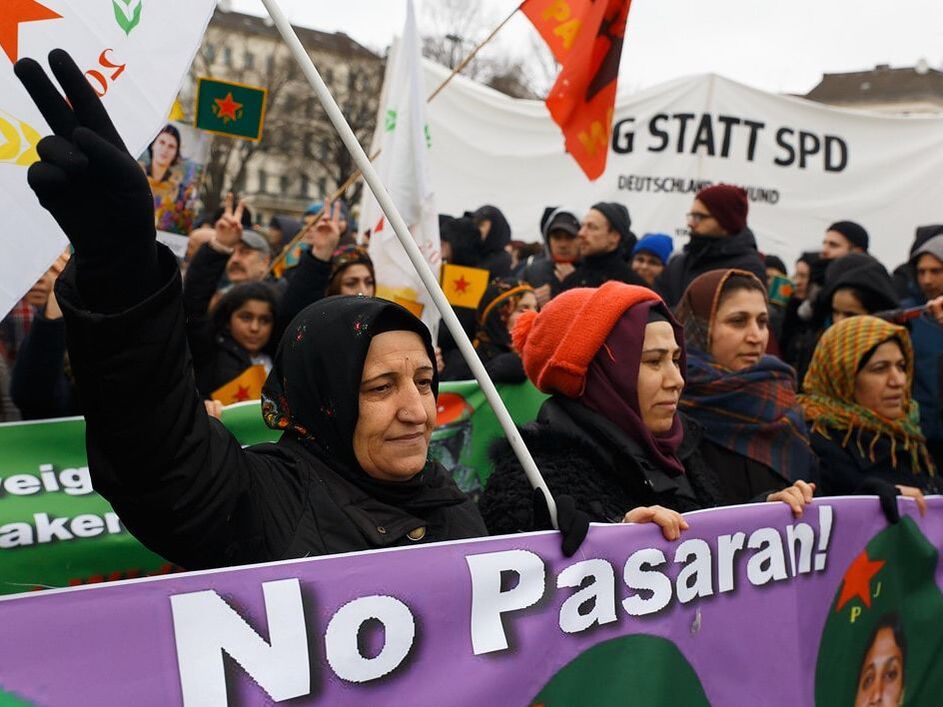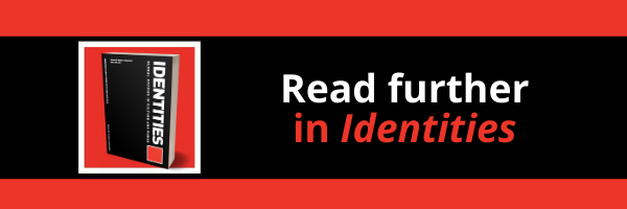|
|
|
Thanks to decades of critical scholarship in the social sciences, it is now common for scholars to reflect on their positionality vis-à-vis research topics and subjects and to demonstrate awareness of the power structures that shape their knowledge production. While this often amounts to deliberations about one’s individual identity in terms of race, gender, class, sexuality, ability, etc., scholars are rarely expected to question the ideological assumptions that underpin how they, both as individuals and as members of societies, make sense of the world. Taking certain ideological positions for granted as universal – liberal, secular, individualist, etc. - presents a problem in the study of political life-worlds that claim to offer alternatives, especially those with revolutionary system change on their horizon.
In my Identities article, ‘Stateless citizenship: 'radical democracy as consciousness-raising' in the Rojava revolution’, published in the special issue ‘Radical Democratic Citizenship: From Practice to Theory’, I write about ways in which protagonists of the self-determination system that has been in the making in majority Kurdish regions of Northern Syria since 2012 imagine their political struggles as a long-term effort for liberation from capitalism, patriarchy and the nation-state. I argue that this amounts to a decolonization effort that – in the words of my interlocutors – beyond the concrete work of building institutional infrastructure, aspires to transform dominant ‘mentalities in society’, including patriarchal and statist thinking which developed over thousands of years of power and domination. While sharing fragments from my fieldwork in Rojava, I decided to consciously center the ideology of the Kurdistan freedom movement, as articulated by imprisoned political leader Abdullah Öcalan, in my conceptual framework.
There were several reasons for taking such an approach to framing the context. Beyond the desire to help close existing gaps in scholarship, there is political value in resisting the epistemic and epistemological limits imposed on the study of radical, anti-colonial notions of democracy that are articulated and practiced as outside the liberal, nation-state system. In such contexts, arising theoretical and methodological problems are often of political nature. When anti-colonial world-making meets genocide, occupation, war and displacement – in part enabled by the interests and policies of the Global North – the boundaries of academic freedom are affected not necessarily by hard censorship, but by more subtle ideological dictates of liberal academia and liberal democracy. This applies in particular to cases like the Kurdistan freedom movement, which is labelled as a terrorist organization by Turkey, the US and the EU, among others. This means that although Öcalan’s progressive thought shapes the movements and struggles of millions of people in the Middle East and beyond, intellectual engagement with this political world continues to constitute a taboo.
On a more general level, academic studies of democracy, revolution and social movements tend to be driven by positivistic perspectives that aim to measure, index and categorize political life along Eurocentric and statist notions of power, politics and social organization. Different epistemic standpoints - revolutionary, feminist, anti-colonial, indigenous and religious/spiritual, etc. – often have different cosmological parameters for making sense of social and political life worlds. These however are frequently side-lined or at best tokenized. Moreover, strikingly, many contemporary radical, revolutionary, system-critical or anti-colonial movements seldom feature in major academic works on social movements and revolution. Meanwhile, much sympathetic academic attention is given to reform-oriented, seemingly horizontal and ‘leaderless’ protest movements in authoritarian contexts as agents of history and political change. To what extent do ideological inclinations and climates play a role in this asymmetry? Again, such questions matter when considering the sparse knowledge production on the Kurdistan freedom movement, one of the largest social movements in the Middle East, a popular struggle with diverse strategies and tactics that impact politics in four regional countries, the diaspora and political projects beyond the region. To complicate things further, the Kurdistan freedom movement, claims, in its literature, media and public work, to make interventions in the realm of knowledge. In the movement’s view, the dominant social sciences fail to offer adequate perspectives and solutions to contemporary social, economic and political issues due to their embeddedness within structures of power and domination. Questioning the movement’s theory and practice is one thing, ignoring their existence altogether is another. In a world in which liberal democracies hold the monopoly over international institutions and frameworks for rights and justice, while their own violence is largely unaccounted for, what is the basis upon which conventional social scientific methods could ‘assess’ the democratic-ness of a system like Rojava’s, which is under construction without proper monitoring by the dominant bodies of the international system and whose references for notions like ‘democracy’, ‘freedom’ and ‘peace’ stem not (or at least not only) from human rights frameworks, but draw on anti-colonial, revolutionary registers? In what ways does the hegemony of liberal democratic worldviews ideologically discourage scholars from raising certain philosophical questions about political life? What answers to such questions, developed in struggles, do we dismiss as ‘too ideological’? Intellectual compliance with political and ideological lines along foreign policy makes it hard for scholars, regardless of their personal sympathies, to critically accompany the life trajectories of political projects, cosmological visions and ideological pronunciations that are developed and acted upon in contexts of violence, dispossession and displacement. To move beyond descriptive accounts of local contexts and to stimulate ground-shifting, critical intellectual debates, scholars of Rojava and similar contexts, and more generally, scholars of social movements, revolution, autonomy, radical democracy and critical citizenship studies should collectively tackle the philosophical, epistemological and methodological issues conditioned by hostile intellectual environments. While this is done in contexts deemed as authoritarian, a critique of the political limits within liberal academia and liberal democracies, which otherwise pride themselves with values like freedom of thought and expression, is for the most part lacking. To do this, especially in a time in which transnational social movements and civil society, autonomous as well as foreign government-sponsored, play increasingly more strategic roles in global politics, deep and open-minded engagement with unconventional political conditions, discourses and cultures is necessary. However, individual scholars’ efforts should also be accompanied by broader, collective processes of ideological self-reflection to question the role that academia plays as a form of soft power of western states. Such interventions that consider movement knowledge seriously can present timely occasions to reflect on phenomena of power on a global scale, such as the meaning of democracy in the 21st century as experienced at the margins of the nation-state system. Affected by these dynamics, radical and revolutionary movements, including the Kurdistan freedom movement, often present intellectually compelling arguments themselves. Scholars can draw on this accumulation of anti-system knowledge to critique the reproduction of liberal discourses, which normalize liberal democratic states’ violence on different parts of the world while marginalizing or criminalizing struggles for system change around the world. This is not to gloss over the many problems, tensions and contradictions that arise in contexts like Rojava. Rather, this is an appeal, in times of discussions about ‘decolonizing academia’, to write against the many (subtle and not so subtle) forms of assimilation into western-centric ideologies, historically legitimized by power, hegemony and violence, which often also serve as tools for foreign policy and state-led perception management. Epistemic shifts of such kind may in fact be necessary for more genuine critiques of radical historical moments. This would constitute an important step towards decolonizing knowledge on political lives (especially but not only) in the Global South, as it may encourage scholars to move beyond fetishizing, symbolic representations of ‘voice’ and ‘lived experience’ as expressions of political will and perspective, and towards critiquing the coloniality of the deeply secular, western-centric and, liberal worldviews within which both, academia and liberal democratic states are located and enforced. Moreover, in times of rising fascism, war and climate crisis, experiences of radical self-determination outside of the parameters of the hegemonic nation-state system, developed in the periphery, can shift debates around the relationship between liberal democracy and liberal state violence on a global scale. This is particularly urgent as war and criminalization make it impossible for political alternatives to survive, let alone flourish and develop their full potential, as seen in NATO armies-led military operations in Kurdistan and beyond. To what extent does liberalism limit the academic horizon? What possibilities for justice, self-determination and politics get rendered invisible or unfeasible along the way? This is a matter of freedom, intellectual and political.
Image credit: Montecruz Foto (CC BY-SA 2.0)
Blog post by Dilar Dirik, Refugee Studies Centre, Oxford Department of International Development, University of Oxford, UK
Read the Identities article: Dirik, Dilar. Stateless citizenship: ‘radical democracy as consciousness-raising’ in the Rojava revolution. Identities: Global Studies in Culture and Power. DOI: 10.1080/1070289X.2021.1970978 OPEN ACCESS
Read further in Identities:
Introducing radical democratic citizenship: from practice to theory Janathana Sarkar (people’s government): rebel governance and agency of the poor in India’s Maoist guerrilla zones Radical democratic citizenship at work in an adverse economic environment: the case of workers’ co-operatives in Scotland Comments are closed.
|
|
Explore Identities at tandfonline.com/GIDE |
|
The views and opinions expressed on The Identities Blog are solely those of the original blog post authors, and not of the journal, Taylor & Francis Group or the University of Glasgow.


